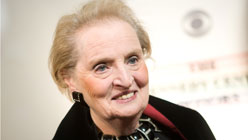Former Secretary of State Madeleine Albright was raised Catholic, but in her 50s she learned her parents were Jewish and that many of her relatives died in the Holocaust. Her family fled to England and narrowly escaped Nazi tanks when she was a toddler. In her new memoir, “Prague Winter,” Albright explores her family history and the story of the birth of Czechoslovakia.
Interview Highlights
On Syria
"The bottom line here is that our democratic processes may not be exactly the ones that suit them. I do think that people want to be able to make decisions about their own lives. I've always believed that we're all the same and everybody does what to make decisions about their own lives. I am very worried about what's going on in Syria, not only in terms of the number of Syrians that have been killed already but the refugee camps. That are in many ways a great burden on Jordan and on Turkey, and the danger of what's happening in Syria spreading to other parts — spreading to Jordan, Lebanon, and then the part that is most worrisome is the role of Iran in all of this.
According to some things I've read there are enough weapons in there, that isn't the issue, in terms of where I think we are doing the right thing, is providing non-lethal assistance, and the U.S. has been very generous on that, to the refugees and the opposition groups in terms of supporting them as they try to figure out how to make it clear to Assad that it's time for him to go."
On What Tools a President Can Use for National Security
"What is it that a president has in that toolbox that he or she can work with in order to change the behavior of a country? There's not a lot in the toolbox. There's diplomacy — bilateral and multilateral, which were about to try again in Kazakhstan next week, there are the economic tools, which are carrots like aid and trade and sticks like sanctions, there's the threat of the use of force, the use of force, law enforcement and intelligence. And the bottom line is that the president has made clear that containment is not a policy, and that all the options, i.e., all the tools are on the table [with Iran]."
On Hilary Clinton and Benghazi
"Well, I think she's answered every question that's come up. The thing that's very hard, and I identify with this is — I loved being Secretary of State. Everybody who knows me knows that. Except on August 7, 1998 when our embassies in Kenya and Tanzania were blown up. And we also had one of those review boards, and the Secretary of State is always ultimately responsible for what goes on, but the bottom line is that clearly there were some failures along the way, and I think she has answered everything that she can about it.
